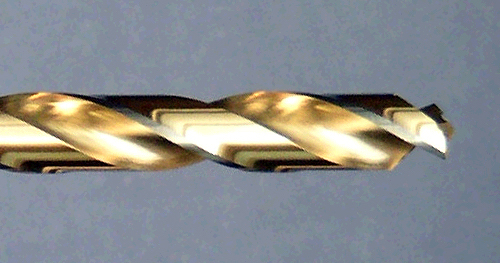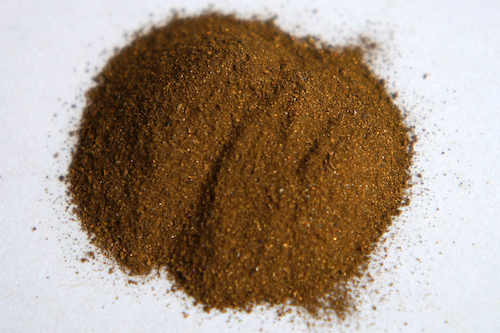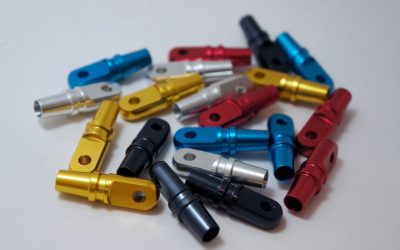Coatings can be beneficial to engineers in various applications. For instance, they can provide improved performance characteristics of materials such as steel, carbide, and titanium alloys, such as increased hardness and adhesion.
In addition, coatings offer protection from wear, corrosion, and temperature. One coating material that engineers should consider is titanium nitride. Let’s discuss the coating and help decide if the coating is right for your application.
What is Titanium Nitride Coating?

Image Source: Peter BinterBinter, CC BY 3.0, via Wikimedia Commons
Titanium Nitride (TiN) coating is a type of coating made of titanium and nitrogen that is used to improve the surface properties of materials such as steel, carbide, and titanium alloys. Titanium Nitride coatings have been used to coat tool steels since the mid-sixties, offering numerous advantages for production.
TiN coatings provide:
- Increased hardness
- Improved adhesion
- Good ductility
- Excellent lubricity
- High chemical stability
- Wear resistance
- Corrosion resistance
- Temperature resistance
These properties help to extend the life of cutting tools, improve the surface quality of products, and increase the production rate.
TiN coating is also widely used in industrial and consumer applications thanks to its excellent wear resistance, corrosion resistance, and ability to reduce friction. In recent years, research into new coating processes has allowed for better control over the properties of TiN coatings on tool steel substrates.
How Does Titanium Nitride Coating Work?

Image Source: Sa123, CC0, via Wikimedia Commons
Titanium Nitride coating works by providing a thin layer of hard, wear-resistant material on the surface of a substrate. The TiN coating is applied to the substrate typically using a process called physical vapor deposition (PVD) which involves vaporizing a small amount of titanium and nitrogen in a vacuum chamber and depositing the vapor onto the surface of the substrate.
PVD Involves three steps:
- Technicians place the material in a vacuum chamber where it is exposed to a high temperature plasma.
- The plasma breaks down the titanium nitride molecules into ions which are then deposited onto the surface of the material.
- As they cool down, they form an extremely hard and durable layer that is resistant to wear and corrosion.
While traditional vapor deposition processes are commonly used to manufacture these coatings, they have limitations. The maximum coating thickness is only a few micrometers, and the deposition rate is relatively low. On the other hand, plasma spray processes allow for the manufacture of thick coatings, but they are unsuitable for processing incongruent materials, such as nitrides.
What Makes Titanium Nitride Coating Unique?
Titanium nitride coatings are unique due to their peculiar properties at elevated temperatures. These coatings have a high resistance to oxidation and hardness, making them suitable for thermal conductive coating applications. With a high microhardness value ranging from 2000-3000 HV, it is significantly harder than some other coatings.
Additionally, they have low reflectivity, making them excellent plasmonic absorbers for solar energy converters as well as catalysts for fastening the hydrocarbons pyrolysis process and reducing the formation of polyaromatic hydrocarbons and soot in biomass energy converters. The golden color that the coating creates is sought after in certain consumer applications, such as watches and jewelry.
What are Some Applications for Titanium Nitride Coating?
Titanium nitride coating is a versatile material that can be used in a wide range of industrial applications.
Cutting Tools
In the metalworking industry, TiN coatings can be used to provide enhanced cutting performance and extended tool life.
They are ideal for machining operations that involve high-speed cutting or where “sticking” is likely to occur during the process. They also provide superior surface hardness and improved abrasion resistance compared with traditional coatings like chrome or nickel plating.
Medical Implants
Titanium nitride coating is also biocompatible, making it suitable for use in medical implants and devices. The coating can help prevent the release of metal ions into the body, reducing the risk of complications and improving patient outcomes. There are some conflicting reports as to whether the coating makes a clinical difference as compared to other coatings.
Industrial
TiN coatings also have many desirable properties in industrial applications, such as improved adhesion between dissimilar materials, increased lubricity in sliding components, electrical insulation for wiring systems, and electromagnetic interference shielding.
Aerospace and Automotive
In the aerospace and automotive industries, titanium nitride coating can withstand high temperatures and is highly resistant to corrosion and oxidation. This makes it ideal for use in high-temperature components, such as turbine blades and engine parts.
Choosing the Right Coating for Your Part
When choosing a coating for their application, engineers should carefully consider a range of factors to ensure that they select a coating that is appropriate for their needs. Titanium nitride is one material that should be considered, as it offers a variety of benefits for many applications. However, engineers must ensure that the coating is appropriate for the specific application they are engineering.
Gensun provides surface finishing services for a variety of applications. We offer high-quality coating solutions that can improve the performance of metals, plastics, and ceramic materials used in engineering projects. By using Gensun’s coating services, engineers can ensure that components are equipped with the best possible protection.





